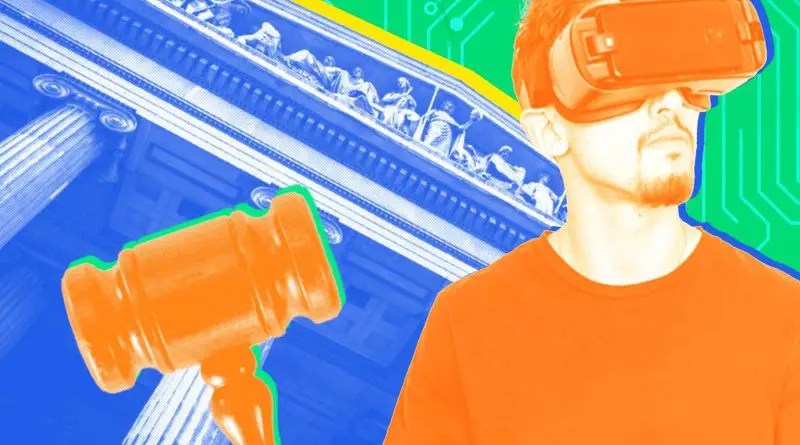What Laws Will Apply in the Metaverse?
As the metaverse evolves and expands so will the number of legal and regulatory issues that legal counsel must assist their clients in navigating. If, as expected, the metaverse evolves into the ultimate convergence of technology, content and human experience, anticipating and addressing emerging legal and regulatory issues will be critical to its successful adoption.
Virtual interactions have become an increasingly important part of life for both consumers and businesses over the last decade. During the COVID-19 pandemic, this trend has accelerated, with both consumers and businesses gravitating toward video conferencing and other forms of virtual interactions. Recently, there has been a surge in interest in virtual interactions, with major corporations, including Facebook, announcing metaverse initiatives. Indeed, Facebook, anticipating the metaverse as the next wave in technology, has incorporated the term into its new name, Meta.
However, the metaverse, like any new foundational technology, remains perplexing and unknown to many. So, exactly what is the metaverse? What metaverse use cases are currently available, and which are expected to emerge? What laws will govern the metaverse? This article delves deeper into these and other questions.
What Exactly Is the Metaverse?
Despite widespread discussion of the metaverse as if it were a finished product, the metaverse is currently little more than a rapidly evolving concept. Talking about the metaverse in 2022 may be akin to talking about the Internet in the 1960s. Even computer scientists can only speculate on what the future might hold in both cases. Modern authors and filmmakers, such as Ernest Cline and Steven Spielberg, who collaborated on Ready Player One, have given us only a sliver of what they imagine one aspect of the metaverse to look like.
The metaverse is not a new concept, and efforts to build one have been ongoing for decades. For example, the San Francisco-based company Linden Lab launched Second Life in 2003, an online multimedia platform in which users create avatars and build a “second life” in an online world. And, as is often the case, science fiction anticipates and foreshadows reality. Snow Crash, a dystopian story featuring a “Metaverse” urban environment complete with virtual real estate accessible through VR goggles, was published in 1992 by writer Neal Stephenson. In the 2018 film Ready Player One (and the book of the same name), much of humanity interacts through the fictional OASIS virtual reality simulation.
In reality, humanity has already taken the first step in this direction during the COVID-19 pandemic, with education migrating online and video meetings supplanting business travel around the world on a scale never before imagined.
Many people see the metaverse’s evolution as the natural progression of the Internet from Web 2.0 to Web 3.0. Many consider Web 1.0 to be the first stage of Internet evolution, during which users primarily consumed content. Users interact with the Internet to create and share content in Web 2.0 (the current dominant paradigm). Web 3.0 introduces disintermediation (the gradual removal of intermediaries) and decentralization, giving users unprecedented control over their Internet experience. The concept of a metaverse, loosely defined, refers to the migration of various aspects of the human experience from the physical world to an increasingly immersive virtual world. The metaverse is fundamentally a pronounced intersection of technology and content.
Video games like Fortnite and Roblox, for example, allow players to enter a complex, expansive virtual world and engage in a wide range of virtual experiences and interactions, including with other players from all over the world. Sensorium, for example, allows users to create their own alter egos and enter a shared virtual space where top DJs perform virtual shows in front of a massive crowd of fellow users.
Horizon World, a “mixed reality” meeting space that allows users to participate in meetings in a virtual world complete with avatars, virtual meeting rooms and tables, and even virtual chalkboards, was recently announced by Facebook. Some platforms, such as Pokémon Go and Illust Space, allow users to explore the real world while being augmented by digital characters and other artifacts. Many of these platforms can be made more immersive by using VR headsets, and future technological advancements such as haptic feedback suits (which enable 3D touch) and omnidirectional treadmills promise to enhance the experience.
As a result, despite references to “The Metaverse,” there is no unitary metaverse experience at this time. Rather, “The Metaverse” refers to an idea that is likely to be embodied in a number of virtual worlds, where technology has the potential to bring content to those worlds in previously unimagined ways, as well as legal issues and challenges never before considered.
The Metaverse’s Current and Future Applications
As previously stated, several aspects of the current versions of the metaverse are already in use or are in the final stages of development. The need for humanity to continue to advance its experiences in commerce, entertainment, and education, especially in a world where personal interaction is forbidden or discouraged due to health risks, has fueled rapid advances in the development of the metaverse in a number of key areas, which are discussed in greater detail below.
Commerce
The fully immersive metaverse is based on Web 3.0 technologies such as blockchain, cryptocurrencies, and non-fungible tokens (NFTs). We have already seen major corporations accept cryptocurrencies as payment for goods and services, and El Salvador was the first country to adopt Bitcoin as a secondary legal tender. In a fully immersive metaverse, cryptocurrencies may be used as payment. Digital goods, whose ownership is frequently recorded with NFTs, have recently found great success, demonstrating the commercial possibilities in the metaverse.
The metaverse also provides excellent opportunities for virtual occupational training. Companies will most likely continue to develop and expand on the current virtual and augmented reality occupational training modules. The metaverse may provide significant opportunities for candidates to gain occupational experience and demonstrate such skills to prospective employers.
The metaverse has and will continue to revolutionize product and service marketing and advertising by creating brand experiences that are more engaging and exciting, giving the consumer a bespoke experience. Many major brands have already embraced the medium in a variety of ways, with significant results in terms of brand engagement and awareness. Virtual events, virtual storefronts, and digital collectibles are just a few of the ways brands and products will reach virtual consumers.
Entertainment
Online video game technological advancements have been a major driver in the required technology for the metaverse. From early pioneers like Second Life to today’s leading interactive online video games, these games have resulted in the rapid evolution of an interactive virtual world for competitive play, as well as the opening of the door for new virtual experiences ranging from concerts to movie premieres to NFTs of all types.
Musical artists such as Lil Nas X, Travis Scott, and Ariana Grande, for example, have all held successful virtual concerts on the online game platforms Roblox and Fortnite, attracting millions of viewers worldwide. As the metaverse becomes more prevalent in popular culture, virtual concerts and sporting events can provide artists and athletes with a new global platform to interact with fans.
Similarly, gameplay will evolve, with opportunities for interconnectivity among various metaverse platforms. Sports and entertainment memorabilia and collectibles, both traditional and virtual, will see increased adoption in the metaverse as conventional NFTs or NFTs with real-world components. The NFL, for example, has created virtual commemorative NFT tickets for its games.
Other leagues and events have sold NFTs that gives participants access to real-world experiences and perks. The metaverse has also increased interest in sports memorabilia and collectibles that only exist in the virtual world. For example, ZED RUN combines NFTs, cryptocurrency, and blockchain technology to create digital horse racing, allowing users to buy, trade, breed, and race their virtual horses.
Education
Until recently, distance learning was regarded as a viable but infrequent means of obtaining a post-secondary degree. That changed during the pandemic, with interactive distance learning implemented for many students ranging from primary school to universities. The COVID-19 era has opened the doors to this type of learning, with its potential to create rich and meaningful learning experiences.
Virtual classrooms are only the beginning of what could become an educational experience in which educators and students can visit, for example, archaeological ruins, the surface of a planet in our solar system, or a person’s DNA. Educators will also be able to incorporate metaverse elements into class projects. Students, for example, can create virtual theme parks using Roblox’s “learn and explore” experiences to demonstrate their understanding of angles and math concepts. As the metaverse grows and evolves, so will the ways in which educators and students can communicate, learn, plan, and exist in a virtual environment.
The Metaverse’s Legal System
Much of the metaverse’s application of existing laws, as well as the potential creation of new laws, is unknown. Existing legal schemes may clearly apply in some cases. In other cases, existing laws don’t quite fit, and courts may be tasked with dealing with novel issues of application to new technology. In other cases, existing laws may be insufficient to address problematic behavior, necessitating the passage of new laws and regulations. The scope of all metaverse laws and regulations that can or might be implicated in a metaverse is practically limitless, resulting in an infinite number of legal issues.
Intellectual Property Rights
Intellectual property disputes will almost certainly be prominent among these legal issues – and, indeed, a number of intellectual property disputes have already arisen in the metaverse and other Web 3.0 projects. In June 2021, Roc-A-Fella Records sued one of its co-founders, Damon Dash, seeking an injunction to prevent him from auctioning an NFT of Jay-Reasonable Z’s Doubt album cover. Roc-A-Fella claims ownership of the album cover copyright and that Dash has no right to sell the album cover as an NFT.
In another case, several well-known figures and celebrities sued Fortnite developer Epic Games in 2018, alleging that the game used each plaintiff’s trademarked dance moves without permission. Tracking and pursuing intellectual property enforcement has generally proven to be a difficult game of whack-a-mole, and we can expect similar difficulties in the metaverse.
The emergence of new types of digital assets, such as digital collectibles documented via NFT, has already raised novel intellectual property issues, such as the scope of the NFT owner’s right to use the content. NFT creators and content licensors are working on a variety of licensing models. The holder of an NBA Top Shot Moment NFT, for example, is granted a limited license to use, copy, and display the underlying content for personal, non-commercial purposes.
The use and exploitation of previously licensed or acquired intellectual property rights in the metaverse raise new questions for licensees and acquirers about the breadth and scope of rights obtained under agreements that may predate the Internet, let alone the metaverse. These critical issues concerning the scope of rights licensed or granted – many of which have previously resulted in disputes between parties with the introduction of new content exploitation methods over the past decades (e.g., CDs, DVDs, digital copies, streaming) – have arisen and will arise in the context of the metaverse, and may pose new legal questions and challenges that are unique due to the way the metaverse operates.
While the scope of intellectual property protection in the metaverse is unclear, there have already been a number of intellectual property disputes in the new NFT market. The possibility of disagreements is even greater in the metaverse. Companies and developers must carefully consider whether they have the necessary intellectual property rights for the proposed metaverse use, and traditional approaches to intellectual property enforcement may be revisited or significantly challenged, as we have seen in recent years with intellectual property incorporated into user-generated content.
Virtual Asset Regulation
Traditional financial regulatory regimes, such as securities, banking, money transmission, and commodities laws, may apply to virtual assets in the metaverse, such as NFTs. Because of the way some blockchain-based assets are developed and sold, they may be considered “investment contracts” and thus subject to securities laws. The application of securities laws would result in a complex set of rules governing sales, trading, and other activities. The metaverse will undoubtedly employ cryptocurrencies and tokens, which may fall under the purview of these regulatory regimes.
The SEC is already grappling with how to apply securities laws to cryptocurrencies and tokens, and one SEC commissioner recently stated that securities laws may apply to certain NFT projects, particularly those that offer fractionalization or entitle the holder to a revenue stream. Aside from securities laws, the issuance, trading, exchange, lending, and other activities involving in-world currencies may be subject to additional regulatory regimes, such as those governing banking, money transmission, and other financial activities.
Tax
When such assets are purchased and sold, they may be subject to a variety of taxes, including income and sales taxes. The US Internal Revenue Service (IRS) has issued guidance clarifying that cryptocurrencies are property with taxable profits. NFTs are thought to be treated similarly. Indeed, the IRS has issued a slew of subpoenas to cryptocurrency exchanges in search of information that could lead to the identification and collection of income taxes, and it would not be surprising to see tax authorities target metaverse projects in a similar manner.
Another unresolved issue is whether NFT and other metaverse asset sales are subject to state sales tax. While many states have issued guidance on how to apply sales tax to digital assets, no state has issued specific guidance on whether sales tax applies to NFTs.
Conduct Control in the Metaverse
Another major issue is who will police the legal limits of conduct in a metaverse. Roblox recently filed a lawsuit against content creator Benjamin Robert Simon, alleging that Simon has been harassing other users in violation of the Roblox terms of service as well as federal and state computer fraud and abuse statutes. A beta tester of Facebook’s VR platform Horizon World recently claimed that she was virtually groped in the Plaza, a virtual Horizon World meeting space. So far, Facebook has responded by noting that users can block one another, but it has not addressed the potential legal consequences of such actions, which may necessitate the novel application of laws intended to address misconduct in the physical world.
On this front, many metaverse projects have terms of service that purport to contractually govern user behavior, with remedies for violations including banishment from the platform and confiscation of in-world assets. For example, before entering the virtual worlds of Fortnite and Roblox, users must accept the terms of service. These terms typically refer to a wide range of behavior, from the restriction of various behaviors to platform security measures to dispute resolution methods. The enforceability of such contractual provisions may raise novel issues, particularly in terms of enforceability between users and individuals who purchase in-world assets outside of the metaverse but have not viewed or agreed to such terms of service.
Gambling and Lottery Legislation
Gambling and lottery laws, which typically govern certain activities involving games of chance with prize awards, may also be involved in metaverse projects that include chance-based opportunities to win prizes. Some metaverse games, for example, include “loot boxes,” which are virtual unopened treasure chests that users can find or buy and open to receive a randomized selection of various virtual assets. The regulation of loot boxes as a form of gambling has already sparked debate in a number of jurisdictions.
Cybersecurity and Privacy
Privacy and cybersecurity are two other emerging issues in metaverse projects. Personal data processing activities such as the collection, use, and transmission of personal data are impacted by privacy. Users’ personal data may be collected by metaverse projects in a variety of ways, ranging from basic identifying information to information about movement and activities in the metaverse.
Metaverse creators should consider implementing privacy policies and internal compliance programs to address these issues. However, applying existing privacy laws to the metaverse raises new concerns. This challenge will only grow as more jurisdictions pass new comprehensive privacy laws, such as those enacted in California, Virginia, and Colorado.
Cybersecurity issues are also unique in the metaverse. Cybersecurity is concerned with how a company protects itself from a third-party attack that could affect data, whether personal or not, as well as information systems. There are several emerging cybersecurity issues, including new guidance on disclosure and controls. Privacy and cybersecurity both have legal implications, as well as other implications, such as governance.
As previously stated, these are only a few of the numerous legal areas that may be triggered by metaverse projects. Others could include sanctions and export control laws, labor laws, criminal laws, and a variety of others. Furthermore, metaverse projects are generally global, allowing participants from all over the world to use and interact with one another. Companies that use the metaverse must consider the risk of complying with multiple jurisdictions’ laws and regulations.




